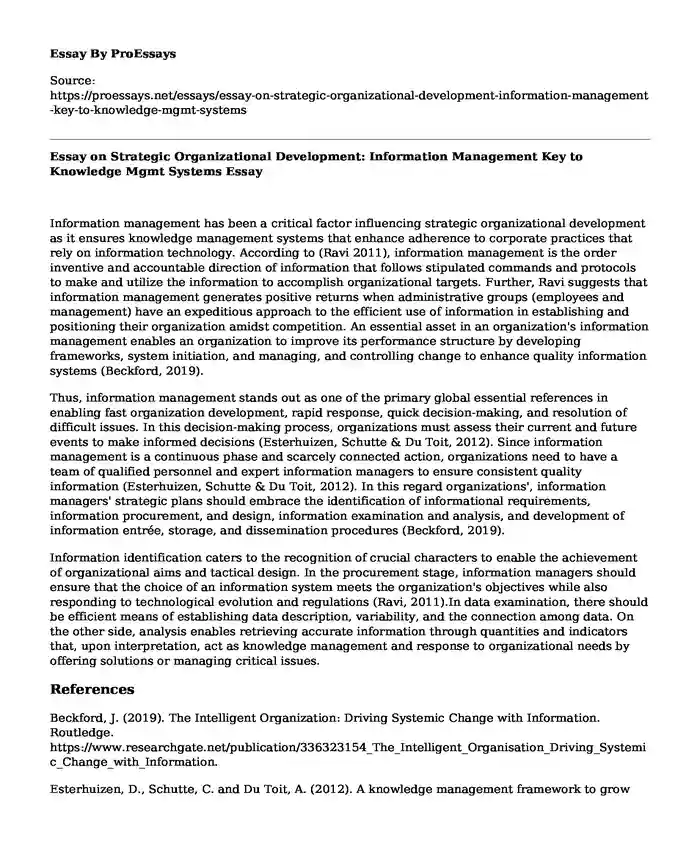Information management has been a critical factor influencing strategic organizational development as it ensures knowledge management systems that enhance adherence to corporate practices that rely on information technology. According to (Ravi 2011), information management is the order inventive and accountable direction of information that follows stipulated commands and protocols to make and utilize the information to accomplish organizational targets. Further, Ravi suggests that information management generates positive returns when administrative groups (employees and management) have an expeditious approach to the efficient use of information in establishing and positioning their organization amidst competition. An essential asset in an organization's information management enables an organization to improve its performance structure by developing frameworks, system initiation, and managing, and controlling change to enhance quality information systems (Beckford, 2019).
Thus, information management stands out as one of the primary global essential references in enabling fast organization development, rapid response, quick decision-making, and resolution of difficult issues. In this decision-making process, organizations must assess their current and future events to make informed decisions (Esterhuizen, Schutte & Du Toit, 2012). Since information management is a continuous phase and scarcely connected action, organizations need to have a team of qualified personnel and expert information managers to ensure consistent quality information (Esterhuizen, Schutte & Du Toit, 2012). In this regard organizations', information managers' strategic plans should embrace the identification of informational requirements, information procurement, and design, information examination and analysis, and development of information entrée, storage, and dissemination procedures (Beckford, 2019).
Information identification caters to the recognition of crucial characters to enable the achievement of organizational aims and tactical design. In the procurement stage, information managers should ensure that the choice of an information system meets the organization's objectives while also responding to technological evolution and regulations (Ravi, 2011).In data examination, there should be efficient means of establishing data description, variability, and the connection among data. On the other side, analysis enables retrieving accurate information through quantities and indicators that, upon interpretation, act as knowledge management and response to organizational needs by offering solutions or managing critical issues.
References
Beckford, J. (2019). The Intelligent Organization: Driving Systemic Change with Information. Routledge. https://www.researchgate.net/publication/336323154_The_Intelligent_Organisation_Driving_Systemic_Change_with_Information.
Esterhuizen, D., Schutte, C. and Du Toit, A. (2012). A knowledge management framework to grow innovation capacity maturity. SA Journal of Information Management, Art 495(10). 14 (1).
Ravi, T. M. (2011). The path to information management nirvana. Information Management Daily.
Cite this page
Essay on Strategic Organizational Development: Information Management Key to Knowledge Mgmt Systems. (2023, Nov 22). Retrieved from https://proessays.net/essays/essay-on-strategic-organizational-development-information-management-key-to-knowledge-mgmt-systems
If you are the original author of this essay and no longer wish to have it published on the ProEssays website, please click below to request its removal:
- Essay Sample on Digital Marketing vs Traditional Marketing
- Key Concepts of Leadership - Essay Sample
- Essay Example on Radburn: Unresolved Issues Affecting Teamwork and Progress
- Essay on Examining US Aggregate Demand & Supply and Policy Impacts (1990s-2000)
- UN-Initiated Sustainable Development Goals: A Vision for 2030 - Research Paper
- Paper Example on Agile Management: Impacts on Organizational Performance & Public Value
- Paper Example on Managing Healthcare Systems: Challenges Facing Leaders







